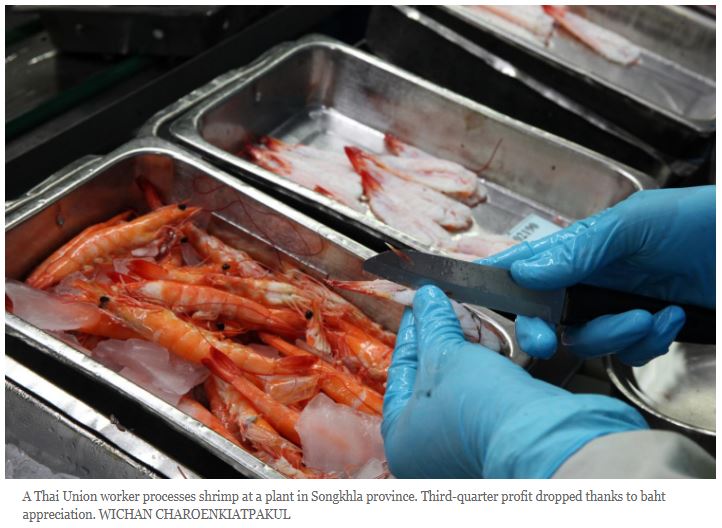Thailand: TU blames baht appreciation for 20% Q3 profit nosedive
SET-listed Thai Union Group Plc (TU), a global seafood conglomerate, reported a 20.6% year-on-year plunge in third-quarter net profit as sales were affected by the baht’s appreciation.
The company reported a net profit of 1.37 billion baht, down 9.2% quarter-on-quarter.
“The decline was mostly driven by weak sales as a result of foreign exchange volatility despite an improvement in gross margin on a consolidated basis,” said TU in its management discussion and analysis for third-quarter results.
Third-quarter sales fell by 6.8% year-on-year to 31.8 billion baht as the baht’s appreciation against key trading currencies, such as the US dollar, the euro and the pound, was the chief culprit for the lower tally.
Excluding the foreign exchange impact, sales would have declined by 1.3% year-on-year because of lower prices of key raw materials such as tuna and shrimp.
Despite improved sales volume for frozen and chilled seafood as well as pet care and value-added products, ambient seafood sales dipped 14% year-on-year largely due to falling tuna prices, which plummeted by 17% year-on-year in the third quarter, and effects from the strengthening local currency.
The company’s nine-month sales also dropped by 4% year-on-year to 93.4 billion baht driven by the baht’s appreciation and falling raw material prices.
Sales would have dropped by 0.5% year-on-year between January and August if the foreign exchange impact is excluded.
In the first nine months of 2019, North America contributed 38% of total sales, followed by Europe at 31%, the Thai market 13% and other markets 18%.
Despite challenges from a decline in raw material prices and the baht’s value, TU was still able to generate an increase of operating profit and net profit by 29.4% and 4.8%, respectively, year-on-year during the first nine months.
“Consumers continue to respond positively to our expanding product line-up, which helped lift our sales volume in the third quarter,” said TU chief executive Thiraphong Chansiri.
“However, volatile currency markets created challenging market conditions for Thai exports and put pressure on our bottom line.”
Regarding the US government’s decision to rescind benefits from the Generalized System of Preference (GSP) for Thailand, coming into effect in April 2020, such a move will not have an impact on the company’s business operations because key import products to the US, including tuna and shrimp, do not benefit from GSP privileges.
TU shares closed on Tuesday on the Stock Exchange of Thailand at 14.20 baht, up 30 satang, in trade worth 469 million baht.
Source: https://www.bangkokpost.com/business/1788159/tu-blames-baht-appreciation-for-20-q3-profit-nosedive


 Thailand
Thailand




